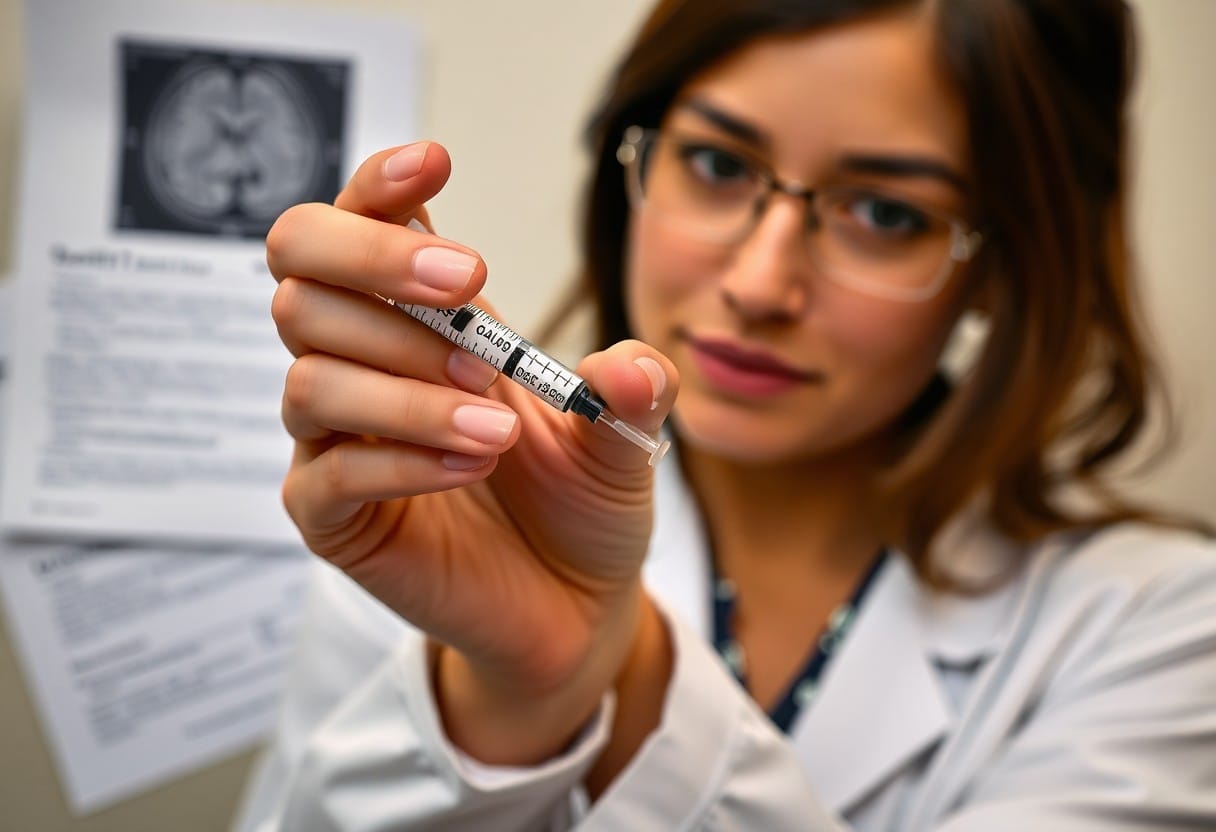It’s important for you to understand the potential risks associated with Depo-Provera, particularly as they relate to brain tumors. As a mother, your health decisions can significantly impact your family’s well-being. In this informative post, we will explore the link between Depo-Provera and potential brain tumor risks, weighing both the positive outcomes and dangers. Knowledge is power; arming yourself with the facts can help you make informed choices regarding your reproductive health and the implications it may have for you and your loved ones.
Understanding Depo-Provera
Your journey into understanding Depo-Provera starts here. This widely used contraceptive method offers women a long-term solution to birth control through an injectable form of the hormone progestin, which is administered every three months. It is favored for its convenience, as you won’t have to think about daily pills, making it an appealing option for many women seeking reliable pregnancy prevention.
What is Depo-Provera?
Understanding Depo-Provera involves recognizing it as a form of hormonal birth control that contains medroxyprogesterone acetate. This synthetic hormone mimics the natural progesterone in your body and is injected into the muscle or under the skin. Depo-Provera is known for providing effective contraception for up to 14 weeks with each shot, requiring only four injections per year to maintain effectiveness.
How Does it Work?
One of the primary mechanisms of Depo-Provera is preventing ovulation. The injected hormone suppresses the ovaries from releasing eggs, thus significantly reducing the likelihood of fertilization. Additionally, Depo-Provera thickens the cervical mucus, making it difficult for sperm to enter the uterus and reach any potential eggs.
Even as you learn about how it works, it’s important to recognize that Depo-Provera offers some positive effects, such as reduced menstrual bleeding and ease of use. However, it also carries potential risks and side effects, including changes in weight and bone density, which may raise concerns for longer-term users. Staying informed about these dangerous details can empower your decision-making process regarding this contraceptive method.
The Link Between Hormonal Contraceptives and Cancer
Some studies have raised concerns about the possible association between hormonal contraceptives and various types of cancer, emphasizing the need for further investigation to clarify these links. Understanding the potential risks involved can help you make informed decisions about your contraceptive options, especially when considering long-term use.
Overview of Research
To navigate the complex relationship between hormonal contraceptives and cancer, extensive research has been conducted. While some studies suggest a potential increase in risk for specific cancers, others indicate minimal or no significant association. Reviewing the latest findings can provide you with a more comprehensive view of how these contraceptives may impact your health.
Focus on Brain Tumors
At the forefront of concerns is the question of whether hormonal contraceptives are linked to brain tumors. Research findings vary, with some studies indicating a possible slight increase in risk, while others find no substantial connection. This ambiguity highlights the need for ongoing research and vigilance in discussing health choices with your healthcare provider.
Hormonal contraceptives such as Depo-Provera have been scrutinized for their possible link to brain tumors. Studies have shown that although there is a potential association, the overall incidence of brain tumors remains low. It is important for you to consider your unique medical history and risk factors before making contraceptive choices. Stay informed by consulting with healthcare professionals who can guide you through your options and help you weigh the benefits against the risks.
Personal Journey: A Mother’s Perspective
If you are a mother navigating the complexities of health concerns related to Depo-Provera, you may feel overwhelmed and scared. Your journey is unique yet relatable, as you seek answers and reassurance while balancing your family’s needs. As you share your story, it empowers and connects you with others facing similar struggles, fostering understanding and support in a challenging time.
Initial Concerns and Symptoms
Any parent can understand the heartache that comes with worrying about their child’s health. You may start to notice unusual symptoms or behaviors that raise red flags, leading to sleepless nights and relentless searches for answers. The experience can be emotionally taxing as you work to provide comfort and clarity amidst uncertainty.
Diagnosis and Treatment Experiences
An necessary step in your journey is receiving a proper diagnosis and understanding treatment options. It often involves various tests and consultations with specialists. This phase can be both enlightening and frightening, as you learn about potential outcomes and available therapies to support your child’s health.
Diagnosis can feel like a rollercoaster as you navigate through the medical system. Your concerns may be taken seriously or brushed off, which can be immensely frustrating. When you finally receive a diagnosis, it may carry a heavy weight; some may even indicate a serious condition. Yet, during this journey, you also find hope in treatment options that provide better quality of life and potential recovery. Open communication with healthcare providers enables you to advocate for your child’s needs and tailor their treatment plan to ensure the best possible outcomes.
Anecdotal Evidence vs. Scientific Data
Now, it’s important to recognize the distinction between anecdotal evidence and rigorous scientific data when discussing health concerns. Personal stories can provide insight and validate experiences, but they lack the systematic investigation found in scientific studies. Understanding this difference is vital, as you navigate the potential risks associated with Depo-Provera and align them with what research shows.
Personal Testimonials
By sharing your experience or hearing from others, you may find comfort or validation in the struggles related to Depo-Provera. These personal testimonials can highlight real-life encounters with symptoms, perceptions of safety, and emotional responses. While influential, these accounts should be considered with caution, as individual experiences can vary greatly.
Evaluating Scientific Studies
Below, examining scientific studies on Depo-Provera is a necessary step in understanding its connection to brain tumors. Studies provide an empirical basis for evaluating potential risks based on large populations and defined methodologies.
This approach enables you to assess the overall risk factors associated with Depo-Provera. By examining large cohorts, researchers investigate patterns that inform you about the incidence of brain tumors. While some studies may suggest a link, others find no significant correlation. It’s important to consider the strength of the evidence, including sample size and study design, to arrive at a balanced understanding of the benefits and risks involved in using this contraceptive method.
Navigating Healthcare Options
Once again, the journey through healthcare options can feel overwhelming, especially when faced with concerns about Depo-Provera and potential health risks like brain tumors. It is crucial to educate yourself on the available choices, balancing the benefits and risks of each option. Understanding your healthcare plan, and discussing alternatives with your provider can empower you to make informed decisions regarding your reproductive health and overall well-being.
Discussing Concerns with Healthcare Providers
Around the time you have concerns about Depo-Provera, it’s important to have open discussions with your healthcare providers. Be candid about your worries, as they can offer guidance based on your medical history and current health status. They may provide clarity on the risks you are apprehensive about and reassure you regarding symptom management and follow-up care.
Seeking Second Opinions
Behind every healthcare decision, seeking a second opinion offers you a broader perspective, particularly when it comes to serious matters like potential brain tumors linked to Depo-Provera. By consulting another expert, you can gain more insight and reassurance regarding your current treatment plan.
With the right approach, obtaining a second opinion can provide you with vital information that empowers your healthcare journey. Engaging with specialists who focus on oncology or reproductive health helps ensure that you receive a thorough evaluation of your condition and treatment options. This step is especially important if you feel uncertain or anxious about your current diagnosis, as a second opinion may offer you peace of mind or even unveil alternative treatments that align better with your health goals. Always prioritize your health by being proactive and seeking out clarity in the face of complex decisions.

Support Resources for Affected Families
For families navigating the challenges posed by brain tumors, finding reliable support resources can greatly alleviate some of the emotional and logistical burdens. Numerous organizations and initiatives are dedicated to providing guidance, emotional support, and practical assistance tailored to those affected by brain tumors. Engaging with these resources can help you discover a sense of community and understanding during difficult times.
Community Support Groups
For many families, community support groups offer a lifeline, allowing you to connect with others who share similar experiences. These groups can provide a safe space where you can share your feelings, ask questions, and gain insights from those who have walked the same path. The camaraderie developed in these settings often helps alleviate feelings of isolation and fear.
Online Resources and Organizations
Any family facing the challenges of brain tumors should explore online resources and organizations, which offer valuable information and services tailored to your needs. With a wealth of educational materials, expert advice, and opportunities for connecting with others, these resources can empower you and your family.
And you can find organizations, such as the National Brain Tumor Society and Brain Tumor Foundation, which offer comprehensive resources including clinical trial information, educational webinars, and links to support groups. They also provide guidance on navigating medical care and understanding treatment options. Utilizing these resources not only helps you stay informed but also connects you with experts and other families who understand your journey, fostering support when you need it most.
Final Words
With these considerations, it’s crucial to stay informed about the potential risks associated with Depo-Provera, including the debated connection to brain tumors. As a mother, you carry the responsibility of understanding the implications for your health and that of your family. Staying in dialogue with your healthcare provider can help you make well-informed decisions tailored to your unique situation. Your health choices should align with reliable information, helping you navigate your reproductive health confidently and responsibly.

















